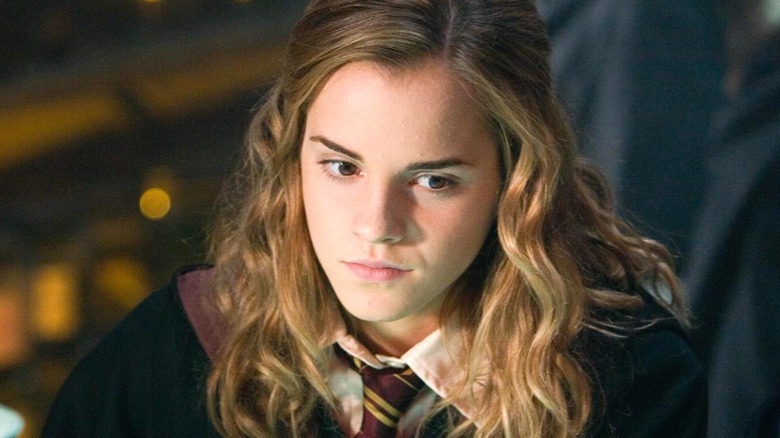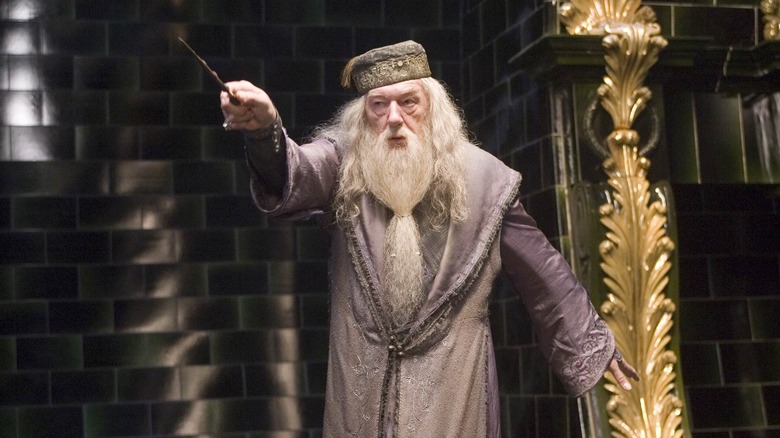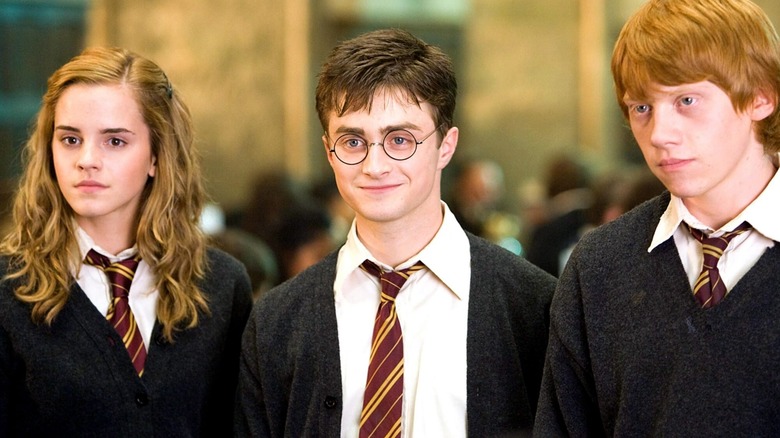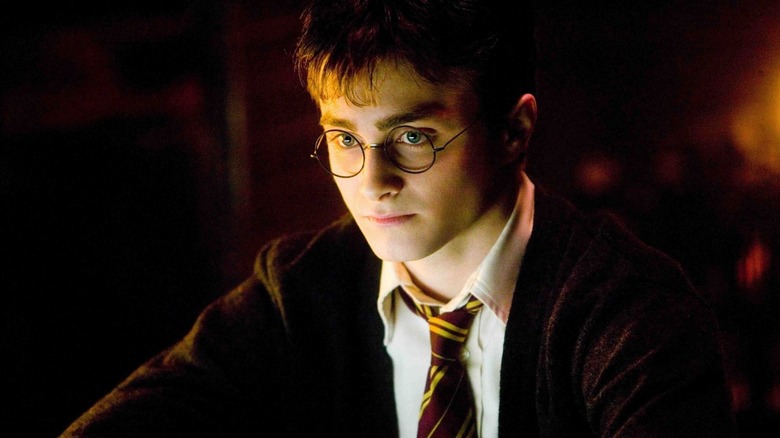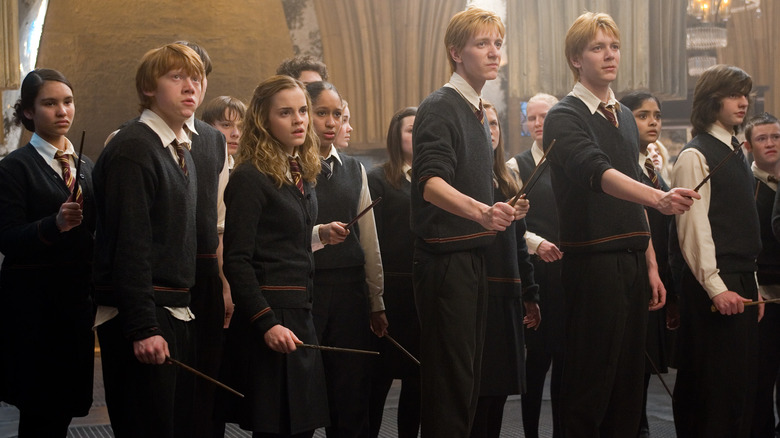The Ending Of Harry Potter And The Order Of The Phoenix Explained
The fifth film in the famous franchise, "Harry Potter and the Order of the Phoenix" adapts the book of the same name by J.K. Rowling, continuing the story of Harry Potter (Daniel Radcliffe) and his fight against Voldemort (Ralph Fiennes) after the deadly events at the end of "Harry Potter and the Goblet of Fire." Joined by his two best friends, Ron Weasley (Rupert Grint) and Hermione Granger (Emma Watson), Harry returns to Hogwarts feeling alone and helpless, as no one in the wizarding world believes his claims that Voldemort is back, and Dumbledore (Michael Gambon) is keeping Harry in the dark.
Over the course of the film, Harry and his friends take it upon themselves to train and form what they call "Dumbledore's Army," rebelling against the brutal Dolores Umbridge (Imelda Staunton) and readying for a fight against He-Who-Must-Not-Be-Named and the Death Eaters. At the same time, Harry is having increasingly painful visions of Voldemort, which the Dark Lord uses to draw Harry into a trap. With his friends by his side, Harry travels to the Ministry of Magic, where the Death Eaters ambush the group and start an all out battle. "Harry Potter and the Order of the Phoenix" is the first installment in the Harry Potter series that is really dark in tone, and it sets up the war between the wizarding world and Voldemort and his followers, which is the main focus of the sixth, seventh, and eighth movies of the series.
Here's the ending of "Harry Potter and the Order of the Phoenix" — explained.
The wizarding world finally believes that Voldemort is back
One of the biggest issues Harry and Dumbledore face in the beginning of "Harry Potter and the Order of the Phoenix" is that the Ministry of Magic and the rest of the wizarding world do not believe the young wizard's claims that Voldemort has returned. After "Harry Potter and the Goblet of Fire" and the death of Cedric Diggory (Robert Pattinson), that still isn't enough for Cornelius Fudge (Robert Hardy), the current Minister for Magic. It takes the battle at the end of the film between the Death Eaters and the Order of the Phoenix to truly convince them of the truth. Of course, they're ones to be in denial until they see it for themselves.
Like any other politician, Fudge initially convinces himself that Dumbledore has some machinations about wanting to be the Minister for Magic himself, and so he believes that the claim that Voldemort has returned has to do with that. Of course, it also seems like Fudge is too scared to really do anything, and to actually face the possibility that the Dark Lord is back is too much for him. In the end, his avoidance and denial still leads to his downfall in politics, as Fudge resigns from his position as Minister after admitting the truth about Voldemort's return. This makes Harry and Dumbledore happy, as people appear to finally be taking the threat seriously.
Voldemort can't overcome the power of love
One of the biggest moments in the final battle is when Voldemort possesses Harry, likely in order to pressure Dumbledore to sacrifice the boy. Unfortunately for He-Who-Must-Not-Be-Named, Voldemort isn't all-powerful, shown through his failure to beat Dumbledore in a one-on-one battle and leading him to resort to the possession. It's also likely that the only reason Voldemort is able to possess Harry is because of their connection — as Harry is technically one of Voldemort's Horcruxes — although neither person realizes this fact by this point in the story. Because of this, Voldemort is still controlled by the limitations of magic — even if he doesn't believe so.
During an internal battle for his own body, Harry is able to overcome Voldemort's control through his own very human emotions. It appears that Voldemort's efforts in possessing him have to do with getting Harry to give up hope, but even after just witnessing the death of his godfather, Sirius Black (Gary Oldman), the only real family he has left, Harry's love for Sirius, his friends, and other people in his life is too much for the Dark Lord to handle. Through his efforts to become immortal, Voldemort destroys the part of himself that's capable of feeling love, and so Harry's intense love and friendship successfully forces the Dark Lord out of his body. Harry calls Voldemort "weak," while the Dark Lord responds that Harry "will lose everything," before running off. Despite this encounter, Harry doesn't seem very put off. In fact, he appears to be almost rejuvenated by the knowledge that his love for his friends is a strength and advantage that Voldemort will never have.
Harry accepts his fate according to the prophecy
At the end of "Harry Potter and the Order of the Phoenix," Dumbledore finally opens up to Harry about the prophecy and what could be ahead for the young hero. While Harry is always well aware that he is the "chosen one," born to defeat Voldemort, there are a few key details that are kept from him as he grows up. The biggest of these is a line in the prophecy that reads, "either must die at the hand of the other for neither can live while the other survives..." This part of the prophecy is purposely hidden from Harry by Dumbledore to allow him some joy and freedom in his youth before he has to face his real destiny. But as the threat of Voldemort and the impending battle becomes more real, Dumbledore's care becomes an issue for Harry, who desperately wants to know what he can do to help.
In the sixth film, Harry finally discovers the key detail of the prophecy, that either Voldemort or Harry will have to die in the end. But at this point, Harry is able to accept his fate since he knows what he's fighting for and understands the value behind his possible sacrifice. As for Voldemort, his whole drive to hear the full prophecy has to do with his desire to avoid his own death. Even though it's obviously warped him and destroyed his humanity, Voldemort still sees himself as evidence of successfully avoiding death and beating magic at its own game, essentially. Seen through his desire to get the full prophecy, it's obvious that Voldemort still believes that he can avoid his own fate, despite the fact that prophecies are inherently always accurate predictions of the future, depending on how they are interpreted.
What are the differences between the movie and the book?
The film ending of "Harry Potter and the Order of the Phoenix" presents a few key differences and omissions from what originally happens in the book. One of the biggest changes is the seriousness of the injuries incurred by Dumbledore's Army during their battle at the Ministry and in the Department of Mysteries. In the book, Ginny Weasley (Bonnie Wright) breaks her ankle, Neville Longbottom (Matthew Lewis) breaks his nose and wand, and Luna Lovegood (Evanna Lynch) gets knocked unconscious, while the movie only includes minor injuries. On top of that, Dumbledore's phoenix, Fawkes, plays a major role in the battle as it is depicted in the novel, but he is completely omitted from the film.
Another very important difference is how it's Harry's intense grief at the loss of Sirius that pushes Voldemort out and stops his possession in the book, while it's Harry's love for his friends in the film. Depending on how you look at it, these are essentially the same thing, but the book puts an even bigger emphasis on Harry and Sirius's relationship and the power of grief. The movie also omits the important backstory of the prophecy, and Harry never finds out that Professor Trelawney (Emma Thompson), is actually the one who spoke the prophecy, along with the fact that Neville easily could've been the chosen one, but it is Voldemort's actions in trying to stop the prophecy that inevitably fulfill it and doom Harry to his fate.
